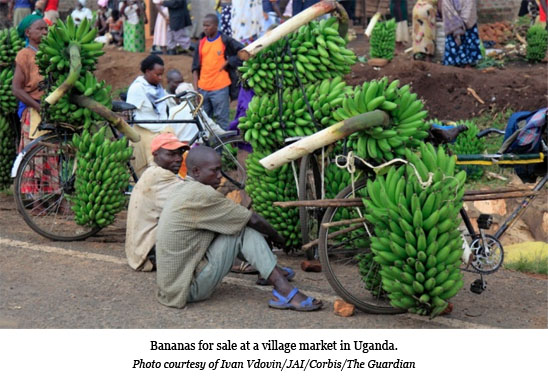by Anna Scott, The Guardian
Bananas are a staple food in Uganda. Ugandans eat more of the fruit than any other country in the world. Each person eats on average 700g (about seven small bananas) a day, according to the International Food Policy Research Institute, and they provide up to 27% of the population’s calorie intake.
But since 2002 a disease known as banana bacterial wilt (BBW) has wiped out crops across the country. When plants are infected, they cannot absorb water so their leaves start to shrivel and they eventually die.

It’s easily spread by tools like pangas and knives not being cleaned after chopping infected crops, and bees transferring nectar between plants. Some farms have lost up to 90% of their yields, with estimated national loss as being up to $360m (£235m) per year.
Many have had to destroy their plantations, as Desiderio Lwanyaga, a farmer in Kyabazala, told IRIN: “I lost 10 acres of banana to the disease … I had to abandon banana farming for a while, though it was our source of food and money.”
The Ugandan government drew upon open data – data that is licensed and made available for anyone to access and share – about the disease made available by Unicef’s community polling project Ureport to deal with the problem.
Ureport mobilises a network of nearly 300,000 volunteers across Uganda, who use their mobiles to report on issues that affect them, from polio immunisation to malaria treatment, child marriage, to crop failure. It gathers data from via SMS polls and publishes the results as open sourced, open datasets.
The results are sent back to community members via SMS along with treatment options and advice on how best to protect their crops. Within five days of the first SMS being sent out, 190,000 Ugandans had learned about the disease and knew how to save bananas on their farms.
Via the Ureport platform, the datasets can also be accessed in real-time by community members, NGOs and the Ugandan government, allowing them to target treatments to where they we needed most. They are also broadcast on radio shows and analysed in articles produced by Ureport, informing wider audiences of scope and nature of the disease and how best to avoid it.
Such initiatives are inexpensive to run and depend on little to work well: minimal technology, the commitment to publishing data openly and an engaged community.
Keeping BBW at bay is still a challenge in Uganda, with awareness-raising and support from policymakers crucial to ongoing progress. Open data produced by Ureport will underpin these initiatives, just as it will underpin many other development interventions in the effort to meet sustainable development goals.
The way forwards for open data and development
Global leaders can enable and promote beneficial uses of open data around the world, and drive development progress more broadly in several ways. The transparency movement increasingly calls for donors to publish what they fund. In turn, donors demand more from recipients to show the impact and effectiveness of the programmes they support.
As more data like this is made open, it can be used by developing country governments as a tool for evidence-based policymaking, helping them to respond to challenges and rely less on aid agencies or donors.
A report published this week by the Open Data Institute (ODI) features stories from around the world which reflect how people are using open date in development. Examples range from accessing school results in Tanzania to building smart cities in Latin America.
Donors can embed open data into funding agreements, ensuring that relevant, high-quality data is collected to report against the SDGs. Funders should mandate that data relating to performance of services, and data produced as a result of funded activity, be released as open data. This should be addressed at the Third International Conference on Financing for Development in July 2015.
Finally, groups across the public and private sectors need to work together to build sustainable supply and demand for data in the developing world. The ODI supports UN Secretary General Ban Ki-moon’s call for a global partnership for sustainable development data, which would foster global technology transfers, policy development and knowledge sharing.
Source: The Guardian
